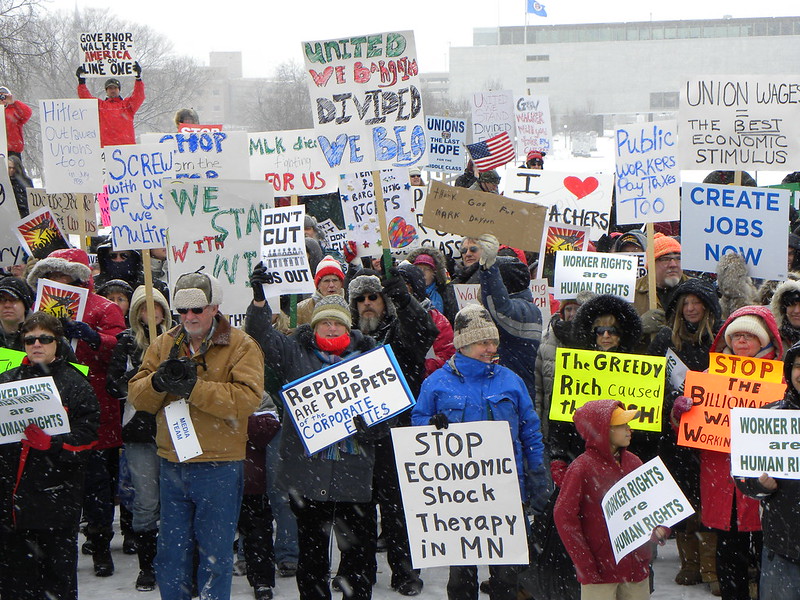Utah lawmakers are pushing a bill that restricts public employee unions statewide. H.B. 285 requires unions to recertify every five years and block automatic deductions from paychecks. It prohibits public employee unions from using public money for union organizing.
This bill does not protect our constitutional right to unionize. In fact, it suggests a desire to discourage workers from doing so. Amendments made to the bill by the legislature were advertised as a compromise — but are still far from ethical. Members of public employee unions justifiably call the bill “union-busting,” which is incredibly concerning in a world still full of inequities.
Right to Unionize
All members of the workforce have a right to unionize. Not only is this right protected by the National Labor Relations Act, but by the U.S. Constitution. The First Amendment grants freedom of association, just as it does freedom of speech and assembly.
Via H.B. 285, Utah legislatures are inarguably making unions harder to join and preventing them from gaining traction. This violation of employee rights is entirely unacceptable. Unions are vital in today’s society. They enhance worker conditions and better democracies. Protecting them is not only in employee interests but should be among government priorities. The Utah legislature’s bill deprioritizes worker activism and therefore problematically reduces accountability for lawmakers.
The Utah Education Association — which is the state’s largest union — vocalized its disapproval since the bill’s introduction. Creating the petition, “Say NO to HB285,” the union believes we must collectively stand up against the bill and its implications. Renée Pinkney, UEA President, expressed the urgency in opposition.
“Let us unite in opposition to this bill, reaffirming our commitment to fair representation, worker rights and the principles of democracy,” Pinkney said in an online statement.
The 17 U.S. states with the highest union densities have, on average, higher household incomes and a smaller uninsured population. Many important advancements in employee rights and working conditions were made possible by union activism. A government that does not value such an important reality poses extreme concern for members of the workforce.
Assembling for Change
Last year, University of Utah Health workers formed a union in response to unsustainable working environments and wages. Unionizing and subsequently improved working conditions extend to patient care. Our nation’s broken healthcare system needs to be addressed and union activism can bring awareness to the issue.
The healthcare union that originated from the U was groundbreaking in many ways. Such an extensive network of teaching hospitals needs worker activism, but the unfortunate reality is that Utah has an incredibly low unionization rate. H.B. 285 restricts protests and gatherings on public property. Such limitations may create difficulty for groups like the U’s healthcare union.
Members of public employee unions have expressed significant concern about the implications of H.B. 285. In an official statement, the UEA publicly opposed the bill. They emphasized the fact that, simply because of who employee unions represent, they are given restricted access to public assembly.
Concerns associated with the bill are varied. The severity of H.B. 285’s implications come down to our constitutional rights. As the UEA puts it, this is a matter of protecting individual freedom and personal choice.
The Danger of Anti-Unionism
Utah is a right-to-work state. RTW laws essentially make union participation optional in the workplace. While proponents of RTW argue that it protects employee freedom, state governments that enact these laws actively diminish the financial strength of unions. Since the implementation of right-to-work laws across the nation, union membership has decreased. RTW states reinforce a lack of awareness regarding unions and their value. Utah is no different.
The beginnings of labor unions coincided with unfair wage reductions for shoemakers in the late 1700s. Later, union leaders like Cesar Chavez made significant advancements in workplace conditions and safety possible. Employee unions are crucial in rectifying workplace injustices. They are also a vital form of free speech and activism, which is protected under the U.S. Constitution.
Unionization has meant real and valuable change for those the system was not designed to advocate for. It has meant creating safe working environments and bringing awareness to issues that the government may not realize on its own. It is, and always has been, a necessary part of society.
A government that imposes limitations on unionization and fails to acknowledge its value is not advocating for its citizens — it’s silencing them. We must protect our constitutional rights to advocate for needed change and, therefore, preserve and defend our right to unionize in the workforce.




Jamie Allyn • Feb 13, 2024 at 2:23 pm
Small correction in third paragraph: It should read, “National Labor Relations Act.” A typo perhaps. The link is correct. Thank you for the article.
Margot Reynolds • Feb 13, 2024 at 3:01 pm
Thank you for the correction, we’ve updated that now!
Jamie Allyn • Feb 14, 2024 at 2:48 pm
Splendid! Kudos to Ms. Hufford and the Chronicle for taking the Legislature to task with this piece. As a union member for nearly fifty years, former officer, and shop steward, I can attest that my quality of life has been made possible by not just the efforts of the union, but also an employer that recognized the value of collective bargaining and stability a union provides over the long term. A tough sell here in Utah for many an enterprise but…hope springs eternal.
John Hedberg • Feb 12, 2024 at 4:17 pm
Davis Guggenheim is the uber-Liberal film maker who helped Al Gore craft the iconic Climate Change documentary, “An Inconvenient Truth”.
After more than a decade researching failing public schools in this country, he then released “Waiting For Superman”, an in-depth study of why schools fail for reasons which appear endemic from coast to coast.
If this article interests you, this documentary will interest you even more, coming from an independent perspective.
You can find a copy free at any public library, if you don’t feel like streaming it~